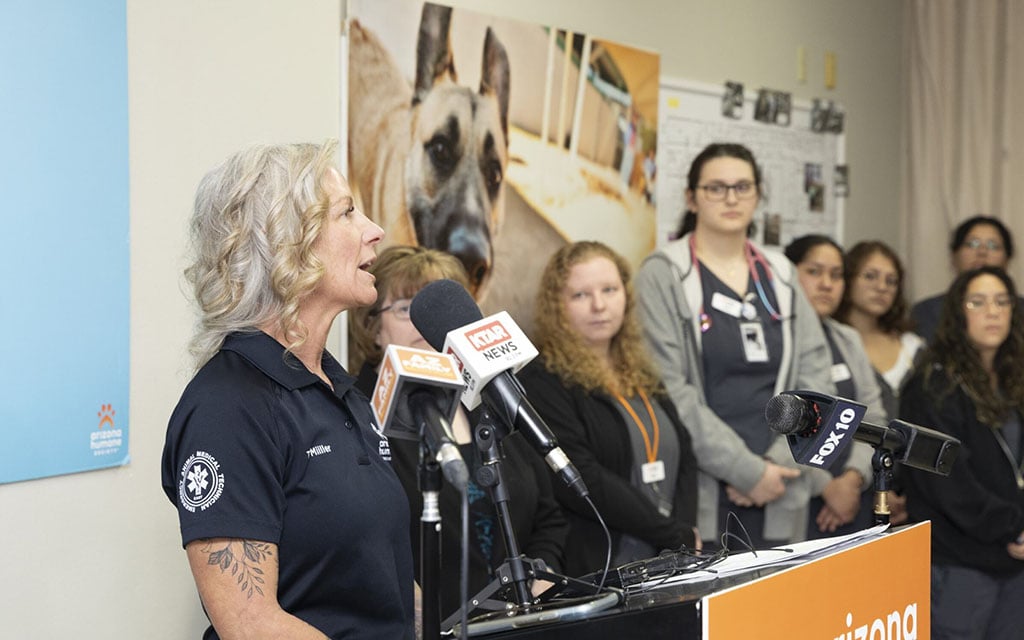CHANDLER – Advocates are pushing for a bill to bolster Arizona’s animal cruelty laws following a surge in reported cases and a high-profile incident in which 55 maltreated dogs were removed last year from a Chandler residence.
Introduced by Sen. T.J. Shope, R-Coolidge, and championed by the Arizona Humane Society, SB 1047 states that a person commits animal cruelty by “intentionally, knowingly or recklessly failing to provide the medical attention necessary to prevent unreasonable suffering to any domestic animal under the person’s custody or control.”
The bill, which passed the Arizona Senate with bipartisan support and is working its way through the House, also defines “cruel neglect” as failing to provide an animal with necessary and adequate food, water and shelter.
“Currently, there are not adequate definitions in place in Arizona state law in order to protect animals,” said Joe Casados, AHS public relations and social media manager. “It leads to a lot of difficult situations, a lot of times where neglect and abuse seems to be apparent – but based on the definition of the law and how loose it is – it’s hard to make it fit.”

Animal-cruelty legislation was announced during a sendoff party for the final 13 dogs still in the shelter that were rescued from a Chandler home last September. (Photo courtesy of AHS)
These proposed changes come after what AHS said was a particularly difficult year in terms of animal abuse cases across the state. In 2023, the organization said it responded to nearly 15,000 calls for service and initiated nearly 10,000 animal abuse investigations – a 21% increase from the previous year.
“There have been a lot of very sad, difficult cases of animal abuse and neglect in Arizona, especially in recent history,” Casados said. “With those numbers increasing, I think what we all hope to see – if and when this bill passes – is the numbers of animal abuse cases dropping, more pets being saved and less news stories about dozens and dozens of pets being found in just terrible conditions.”
Supporters of the bill say that refining the legal definition will provide law enforcement the tools needed to act earlier and more often in cases involving animal abuse and neglect.
“It gives them (law enforcement) more of an opportunity to see something and do something about it. The law has a lot of gray area,” Casados said, offering the example of a puddle on the ground being classified as an adequate water supply for a pet. “So now they’d have the ability to say that that water is not fit for consumption, and we need to get them (the animal) out of this situation for their safety.”
The legislation was announced four months after authorities seized 55 dogs from Chandler resident April McLaughlin’s home. Authorities say McLaughlin, who claimed to run a shelter for dogs with special needs, allegedly kept them in unsuitable conditions. The bodies of five dogs were also found in a freezer in her home, according to Phoenix New Times. In January, McLaughlin was indicted by a grand jury on 24 counts of animal cruelty, in addition to 77 misdemeanor charges, according to Arizona’s Family.
“It was discovered that the animals were not being provided with access to water or food and were being kept in overcrowded cages, in dark rooms and generally unsanitary conditions,” Chandler Mayor Kevin Hartke said at a March 18 hearing of the House Land, Agriculture and Rural Affairs committee on the bill. “These vulnerable animals were being forced to live in conditions that would be described as deplorable at the best.”

After Arizona Humane Society received full custody of the dogs rescued from a Chandler home, it connected the animals with rescue groups working to find homes suitable for each of their special needs. (Photo courtesy of AHS)
According to Jason Sieczkowski, interim assistant chief of the investigations bureau at the Chandler Police Department, the case drew officials’ attention to the city’s loose and nonspecific animal cruelty ordinances.
“(There were) a couple of challenges that we identified while collaborating and trying to get this code updated,” Sieczkowski said. “Our code too narrowly defined what animal cruelty was. It did not adequately address the issue of animals seized for safekeeping purposes in non-cruelty cases, and it did not provide adequate regulations relating to the hoarding of animals and unsafe or unsanitary conditions.”
In December, the Chandler City Council voted unanimously to approve an ordinance that amends the city’s current code to include a new offense for animal hoarding and allows officials to seize animals that are suspected of being abused.
Though city ordinances are a beginning, advocates argue that statewide reform is crucial to ensure the protection of pets.
“Arizona’s pets have been victims of a weak statewide animal cruelty law for far too long,” AHS President and CEO Dr. Steven Hansen said in a news release. “While some cities have passed ordinances to provide additional protections for pets, the time has come for the whole state of Arizona to stand against animal cruelty.”
As SB1047 makes its way through the legislative process, supporters remain hopeful that these changes will usher in a new era of accountability and protection for Arizona’s pets.
“As someone who served in law enforcement and worked with prosecutors for almost two decades, I know that this bill will provide us with the tools necessary to save lives,” said Tracey Miiller, AHS’s director of field operations. “It’s only been a few months since this horrific Chandler case, and these dogs deserve better. And we could have done more for these animals quicker if Senate Bill 1047 would have been in place. We are here standing steadfast in ensuring a situation like this never happens again.”

